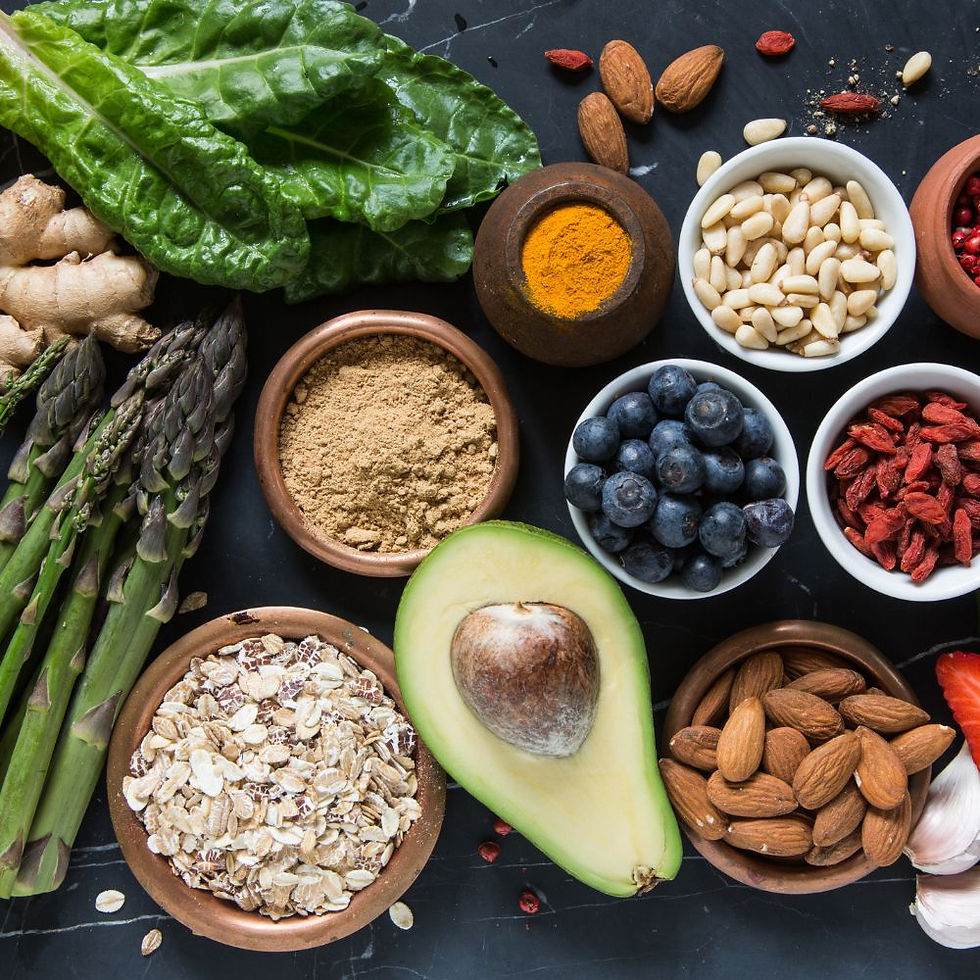
Your Brain Needs Nutrition Too
It’s easy to focus on calories or portion sizes, but your nervous system, hormones, digestion, and mental health still need support, even on a calorie-restricted diet. In fact, this is when it's more important than ever.
Protein helps with energy and tissue repair.
Healthy fats help regulate hormones and support your brain.
Fibre supports digestion and blood sugar stability.
Vitamins and minerals? You already know the deal, they’re the silent MVPs in almost every function your body performs.
A spoonful of something nourishing now is an investment in how you feel and function later.
No, You Don’t Have to Be “Perfect”
Some days you’ll eat the soup, other days, it’ll be two bites of toast and half a biscuit, and if that's what you feel like, then that’s okay.
But when you do feel able to eat, and you do feel like making a choice, try to give your body something that's not overfilling and packed with nutrition.
TL;DR
When you’re eating less, every mouthful matters. Choose foods that are gentle on your stomach and rich in nutrients, like soups, yoghurt, eggs, oats, and soft proteins. You don’t need to eat a lot, but when you do eat, make it count.
Easy-on-the-stomach, High-on-the-benefit Foods
Everyone’s different, but these types of foods tend to be well-tolerated and genuinely useful:
🍲 Soups and broths
Especially ones with protein (chicken, lentils) and soft veg. Hydrating, easy to digest, and nutrition-dense in small amounts.
🥚 Eggs
Scrambled, boiled, poached. Gentle on the stomach, packed with protein, and quick to make.
But there is a word of warning here: If you are suffering from the burp side effect, you may find that eggs contribute to it, resulting in an eggy burp. A lot of people report getting the Ick for eggs when taking GLP-1s.
🇬🇷 Greek yoghurt or Skyr
Go for natural, low-sugar options, ideally with at least 10g of protein per 100g.
These types of yoghurt are thicker and higher in protein than regular yoghurt, which helps keep you fuller for longer and supports muscle maintenance (especially important during weight loss). They also contain calcium for bone health and live cultures for gut health, all in a few easy spoonfuls.
Add a few berries for antioxidants, or a sprinkle of chia or flax seeds for a fibre and omega-3 boost, and a drizzle of honey for a sweet natural sugar energy boost.
🥣 Oats or overnight oats
Soft, customisable, and great for blood sugar balance.
Oats are a gentle, slow-digesting carb, which means they release energy gradually, helping to keep you steady instead of spiking and crashing. They also contain beta-glucan, a type of soluble fibre that’s been linked to improved cholesterol and heart health.
Add protein (like Greek yoghurt or protein powder), healthy fats (nut butter, seeds), or fruit to turn it into a balanced little meal in a few bites.
🥤 Smoothies
A smart way to sneak in protein, fibre, healthy fats, and greens, especially if solids feel like too much.
Blend up a small mix of things your body needs:
A protein source (like protein powder, Greek yoghurt, or tofu)
Something creamy (banana, avocado, oats, nut butter)
Fibre (chia seeds, flax, oats)
A handful of greens or berries
It’s easy to sip, easy to digest, and surprisingly filling, even in a small portion.
🍚 Rice Bowls with Soft Veggies and Lean Protein
Small portions, big nourishment.
When your appetite’s low, rice bowls are an easy way to build balance without overthinking it.
Soft rice = quick carbs for energy
Veggies = fibre and essential nutrients
Lean protein (like chicken, tofu, salmon) = keeps you full and supports muscle
Add a sauce or seasoning you enjoy. You don’t need much; a few bites can go a long way.
🥑 Avocado on Toast
Healthy fats, fibre, and satisfying without being heavy.
Avocados are rich in monounsaturated fats, which support hormone health and help you absorb fat-soluble vitamins (like A, D, E and K). They’re also high in fibre, which matters more than ever when digestion slows down on GLP-1s.
Pair with wholegrain toast for some extra carbs and B vitamins, or add a poached egg on top if you’re feeling fancy.
🥕 Stewed or Roasted Veg
Easier to digest than raw, and still packed with nutrients.
Cooking veg helps soften the fibre, making it gentler on your stomach, but still full of goodness like vitamin C, potassium, antioxidants, and fibre.
Try carrots, courgettes, squash, sweet potatoes, or peppers. Add olive oil or herbs for flavour and absorption. A few forkfuls can easily tick off one or two of your daily veg.
🥢 Tofu or Soft Fish
Gentle proteins that don’t take much chewing or effort.
Tofu is easy on the stomach and surprisingly versatile; it’s also a good source of iron, calcium, and plant-based protein. Soft fish like salmon or cod give you high-quality protein and omega-3s, which support heart, brain, and joint health.
These are great options when you need something low-effort that still delivers real nourishment.
When your appetite shrinks, every bite matters
One of the first things people say after starting a GLP-1 like Ozempic or Mounjaro is: “I can’t eat much anymore.”
And yes, that is the point, but it also means that what you do eat suddenly matters a whole lot more.
If you’re only managing small portions before the appetite suppression kicks in, those few bites need to do some heavy lifting, keeping you nourished, energised, and feeling good even when your portions are small.
Here’s a guide to smart, satisfying food choices that work with your new appetite, not against it.
Think: Nutrients per Bite
Let’s say you can only manage two or three spoonfuls at a time. That’s totally normal on GLP-1s. But here’s the thing:
Two spoonfuls of flavoured yoghurt? You’re mostly getting sugar, a bit of fat, and not much else.
Two spoonfuls of a veggie-packed chicken soup? You’re getting protein, fibre, vitamins, minerals, hydration, and slow-burning carbs, all in the same amount of food.
That doesn’t mean you can’t have yoghurt. But it’s worth noticing what those few mouthfuls are doing for you, and whether they’ll actually keep you going.
When your appetite is low, your body still needs fuel, just in smaller, smarter doses.
Published:
21 Jul 2025
Updated:
6 Oct 2025
What to Eat on GLP-1s: The Basics
Tuning In

Helpful Companions For Your Weight Loss Journey
From meal ideas to daily tracking, these digital tools are designed to make life on GLP-1s a little easier.









.jpg)

.jpg)
.jpg)